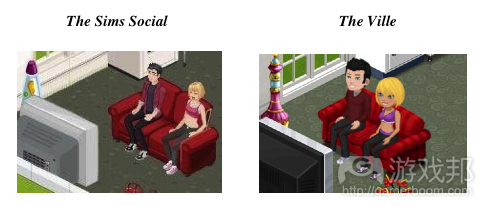论述EA & Zynga侵权控诉的决定性影响
作者:Leigh Alexander
EA针对Zynga提起的游戏模仿诉讼若最终胜出,将给移动和社交领域带来深远影响。据某专攻数字游戏领域的法律教授表示,EA的获胜机会很大。
罗格斯大学的Greg Lastowka表示,显然Zynga的《The Ville》模仿了《The Sims Social》,从类似的“个性类型”选择到角色行为和外表元素。但EA需要证明的是,他们的模仿太过头了。
模仿游戏构思并非不合法,只是参照细节内容就有些不妥。Lastowka表示,这一案件特别有趣是因为控诉只围绕一个问题——侵犯版权。他表示,通常来说,游戏的多数法律诉讼都包含额外诉因,例如不公平竞争或商标侵权。
他继续表示,“另一有趣之处在于,克隆问题如此普遍,Zynga已被指控多次。”事实上,该公司自初期发行作品以来就持续面临抄袭指控,如《黑手党战争》(游戏邦注:Zynga赔偿《Mob Wars》开发者约700万美元)。
Zynga最近因作品《Dream Heights》和NimbleBit的热门游戏《迷你大楼》存在惊人相似之处而遭遇公开惩戒,但鲜有独立开发者能够在法律上同此巨头公司抗衡。
Lastowka表示,“像EA这种有能力将诉讼进行到底的大公司与Zynga正面交锋,这还是头一回出现。所以这并非旨在寻找一个解决方案的法律诉讼。”
这里的主要问题要比Facebook游戏大很多。通过复制《The Sims Social》,Zynga提取了Maxis Sims品牌整个生命周期中的独特元素。
例如,《The Ville》角色的模糊表达方式和“模拟市民语”非常相似,旨在表明角色兴趣或意图的对话泡泡也和《模拟人生》这一游戏品牌特色相雷同。就连界面也引入后者若干图标元素——独特圆形字体,或是现代蓝色和浅绿色。
Lastowka表示,“我觉得Maxis团队多半觉得,Zynga的模仿行为触及《模拟人生》的核心要素。我记得他们说过,‘关于这一问题我们不能坐视不管。’我觉得从某种程度上来说,如果他们想要保护作品,就必须采取举措。”
艰苦战斗
但有若干挑战元素促使EA面临艰苦战斗。首先,Facebook领域的成功其实依赖于从成功作品的最佳实践中吸取经验,从很多方面来说,就是借用他们的构思。
例如,和很多Facebook游戏一样,《The Sims Social》本身也利用若干Zynga主导的核心机制——采用类似方式混合能量机制、拜访和馈赠及土地维护元素,Zynga很快在有关诉讼问题的新闻报道陈述中指出这点。
Lastowka表示,另一挑战是,电子游戏通常不为法官们所熟知,因为这一群体大多来自更早期、不那么熟悉数字领域的年代。
他解释表示,“当法院分析电子游戏时,他们通常将此同电影进行类比。有时受理案件的法官年龄超过60岁;他们不玩游戏,对他们来说,现代游戏就像是动画片。他们会寻找被复制的叙述结构或角色。”
因此,Zynga多半会争辩称,游戏的角色和世界由玩家决定,游戏本身有点像是不受版权法保护的制度或程序。EA展示的截图在某种程度上看起来非常相似,这是因为在各镜头中,角色或环境的装饰或色彩如出一辙——而这些是玩家的选择。
另一复杂元素在于,证明侵犯版权的困难性。定义侵犯版权的方式多种多样:在第二巡回法庭上(纽约、康涅狄格州和佛蒙特州),他们将版权侵犯问题分成两块:核心构思无法得到保护,特殊表达应服从于更高层次的保护。
加利福尼亚的第九巡回法院(游戏邦注:也就是诉讼案件存档的地点)通过分析外在功能质疑大量相似性,同时进行普通玩家是否能够将两款产品区分开来的判断。Lastowka表示,这一问题的处理方式有利于EA。
“一个强有力的论据”
EA的开场白围绕两款游戏相似之处的视觉比较,他们多半将继续根据第九巡回法院的定义证明版权侵权问题,而Zynga则将基于“特殊表达”辩护予以反击。
关于特殊表达,我打个比方,假设有人通过截然不同的语言和角色&地点名称改写J.K.罗琳的《哈利·波特》系列,但故事原封不动。改写者也许会称,他们是就核心构思进行特殊表达。当然,罗琳的书籍非常庞大且复杂,这位改写者显然违反了版权法。
这一类推对于在游戏方面了解不多的法律制度来说是否有意义,我们还需拭目以待。真正体验《The Ville》和《The Sims Social》就会发现,二者存在显著差异,而这点EA没有在其控诉中提及。EA Sims品牌的独特道具更容易被法官所理解。
Lastowka表示,“Zynga将积极推进构思表达二分法;他们会说他们借鉴了构思,但有自己的个性表达。”
“如果他们向EA提出反诉,我也不会感到惊讶,因为法院可能会不解在电子游戏背景下,什么是创造性,这些游戏没有情节,有的是选择机制,因此法院会试着抓住这点,而Zynga也能够从中找到些许托辞。”
Lastowka表示,但总的来说,“EA持有强有力的论据。”
就法律先例来说,结果非常有趣。重要的是,决定性的EA胜利将带来先例,这样独立开发者就能够避免自身作品被大公司模仿时处于无能为力境地。游戏公司在模仿他人作品上就会持谨慎态度。
若Zynga在此案件中被击败,发生于《迷你大楼》、《Mob Wars》、《Farmtown》、《Restaurant City》或《Bingo Blitz》的模仿问题可能就不会再次出现。(本文为游戏邦/gamerboom.com编译,拒绝任何不保留版权的转载,如需转载请联系:游戏邦)
The case against Zynga: What if EA wins?
by Leigh Alexander
Electronic Arts’ game-copying lawsuit against Zynga could have wide-reaching ramifications for the mobile and social space if EA wins. And EA has a good chance of winning, according to a professor of law who specializes in digital games.
Rutgers’ Greg Lastowka tells Gamasutra that it’s clear that Zynga’s The Ville has copied from The Sims Social, from its use of very similar “personality type” choices to elements of character behavior and appearance. But what EA will have to prove is that the copying went too far.
It’s not illegal to copy the idea of a game, just its particulars. Lastowka says the case is particularly interesting because there’s just one count — copyright infringement — in the complaint. Normally, he says, most smilar lawsuits in games also include additional causes of action like unfair competition or trademark infringement.
“The other thing that’s interesting about it is that cloning is so common, and Zynga has been accused of it many times,” he continues. In fact, the company’s been fielding accusations of copying even since its earlier games, like Mafia Wars (Zynga settled for about $7 million with the developer of Mob Wars).
Zynga most recently faced public chastisement for the uncanny similarity of its Dream Heights to NimbleBit’s popular Tiny Tower, but there’s little indies can do legally to take the giant on.
“This is the first time we’ve got a major [company] like EA who can actually finance a suit through to the end,” Lastowka says. “So it’s not just a lawsuit designed to extract a settlement.”
The key issue here may be bigger than Facebook games. By copying The Sims Social, Zynga actually ends up lifting elements that have been unique to Maxis’ Sims brand for its entire long lifetime.
The Ville characters speak in a sort of babble that resembles “Simlish,” and the way icons appear in characters’ thought bubbles to indicate their interests or intentions has until now been fairly unique to the franchise, for example. Even the interface borrows some iconic elements — the distinct rounded font, or the modern blue and aqua palette.
“I think the Maxis team probably feels like Zynga’s copying practices have gone to the heart of what defines The Sims, and I think they said, ‘We don’t have to sit still for this,’” Lastowka says. “I think in a way they really had to do this, if they want to protect that franchise.”
A tough fight
But there are a number of challenging factors that could spell a tough fight for EA. For one thing, success in the Facebook space actually depends on learning from the best practices of successful games and, in many cases, borrowing them.
For example, like many Facebook games, The Sims Social itself uses some core mechanics pioneered by Zynga — a similar cocktail of Energy system, visiting and gifting, and land maintenance, and Zynga was quick to point this out in its statement to the press on the suit.
Another challenge, says Lastowka, is that video games in general are not commonly well-understood by judges, who in often come from an older and less digitally-savvy generation.
“When courts analyze video games, they often do so by analogizing them to movies,” he explains. “You have appellate judges who are 60 years old; they don’t play games, and to them a modern game looks like an animated cartoon. They’ll look for a narrative structure or characters that are being copied.”
As a result, Zynga is likely to argue that the game’s characters and world are determined by the player, and that the game itself is the kind of system or process not covered by copyright law. The screenshots EA shows look so alike in part because in each shot, the character or environment is dressed or colored the same — those are player choices.
Another complicating factor is the difficulty in proving copyright infringement in general. There are a multiple ways of defining copyright infringement: In the court’s second circuit (New York, Connecticut and Vermont), they break down issues of copyright infringement into two parts: A core idea that can’t be protected, and a particularized expression subject to a high level of protection.
California’s 9th circuit — notably where this suit was filed — questions substantial similarities through an analysis of extrinsic features, plus a judgment of whether your average person would be able to tell two products apart. That method of looking at the issue favors EA in this case, Lastowka suggests.
‘A pretty strong case’
EA’s opening salvo involves visual comparisons of how alike the two games are, and as such they can be expected to continue trying to prove copyright infringement under the 9th circuit’s definition, while Zynga can be expected to push back under the “particularized expression” defense.
To understand particularized expression, let’s say someone rewrites J.K. Rowling’s Harry Potter books using entirely different words and different names for the characters and places, but leaves the story otherwise intact. That re-writer might argue that they’re making a particularized expression of a core idea. Of course, Rowling’s books are massive and complex, and this re-writer would be committing a clear violation of copyright law.
It remains to be seen whether that analogy will make sense to a legal system that has relatively little experience understanding games. And when one actually plays The Ville and The Sims Social, there are some noticeable differences that EA hasn’t mentioned in its complaint. Still, items unique to EA’s Sims brand in general may be more easily understood by a judge.
“[Zynga will] push hard on the idea-expression dichotomy; they’re going to say they copied the idea, but not the individual expression,” suggests Lastowka.
“And I wouldn’t be surprised if they brought a counterclaim against EA, because if the court is going to be confused about what is creativity in the video game context… these games don’t have a plot, they have a system of choices, so the courts will try to grapple with this, and Zynga could try to throw some dust up.”
All in all, though, “EA has a pretty strong case,” Lastowka opines.
And the outcome will be especially interesting in terms of law precedent. Importantly, a decisive EA victory could create the precedent that indies would need in order to be safe from having their games cloned by big companies they can’t afford to fight. All game companies will become markedly more hesitant to engage in blatant copying.
If Zynga’s defeated in this case, then what happened to Tiny Tower — or Mob Wars, or Farmtown, or Restaurant City, or Bingo Blitz — may not have to happen to anyone again.
Screenshots and videos are from EA’s complaint.(Source:gamasutra)
上一篇:论述游戏设计中的消极游戏机制










































 闽公网安备35020302001549号
闽公网安备35020302001549号